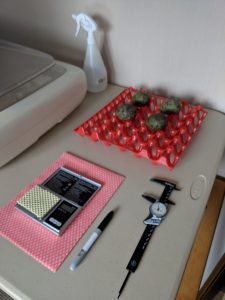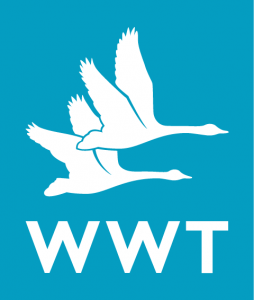UK Lowland Curlew Recovery (Curlew Country) and The Wildfowl and Wetlands Trust collaborate to help the lowland curlew population survive.
 Following the findings of the first two years of the project, when no chicks successfully fledged from nests, Curlew Country decided to take drastic measures to prevent the signficant population of local curlew from dying out. In 2018 it applied for the first ever UK licence to ‘headstart’ – incubate curlew eggs and rear chicks. The Project Manager and Assistant incubated the eggs and reared the resulting chicks which led to the successful release of 21 chicks at fledging stage. Everything was achieved on a relative shoestring, with basic limited equipment and no scientific experience of rearing other birds in similar circumstances.
Following the findings of the first two years of the project, when no chicks successfully fledged from nests, Curlew Country decided to take drastic measures to prevent the signficant population of local curlew from dying out. In 2018 it applied for the first ever UK licence to ‘headstart’ – incubate curlew eggs and rear chicks. The Project Manager and Assistant incubated the eggs and reared the resulting chicks which led to the successful release of 21 chicks at fledging stage. Everything was achieved on a relative shoestring, with basic limited equipment and no scientific experience of rearing other birds in similar circumstances. 
Each egg is so precious and requires attention over long hours. For the small Curlew Country team integrating these additional tasks into its usual duties was a challenge. This year The Wildfowl and Wetlands Trust (WWT) is colloborating with Curlew Country to bring its experience of rearing another UK wader species (Black tailed Godwits) to Curlew Country. WWT is supporting the project with the provision of better  equipment, staff and expertise in avicultural work. Curlew Country is keen to do all it can to ensure that each egg and chick has the best chance of survival. Project Manager Amanda Perkins said ‘ Our success in fledging chicks has been good so far, but we want to do all that we can to improve the ratio of eggs collected to chicks fledged. We look forward to learning technical expertise from WWT this year.’ Dr. Geoff Hilton, Head of Conservation Science at The Wildfowl and Wetlands Trust ‘We will be involved with ‘headstarting’ curlew at 3 sites this year building on our success with other species.’
equipment, staff and expertise in avicultural work. Curlew Country is keen to do all it can to ensure that each egg and chick has the best chance of survival. Project Manager Amanda Perkins said ‘ Our success in fledging chicks has been good so far, but we want to do all that we can to improve the ratio of eggs collected to chicks fledged. We look forward to learning technical expertise from WWT this year.’ Dr. Geoff Hilton, Head of Conservation Science at The Wildfowl and Wetlands Trust ‘We will be involved with ‘headstarting’ curlew at 3 sites this year building on our success with other species.’
Curlews are an iconic bird with which entire communities engage, the two organisations aim to help them keep this beloved bird in their landscapes.

